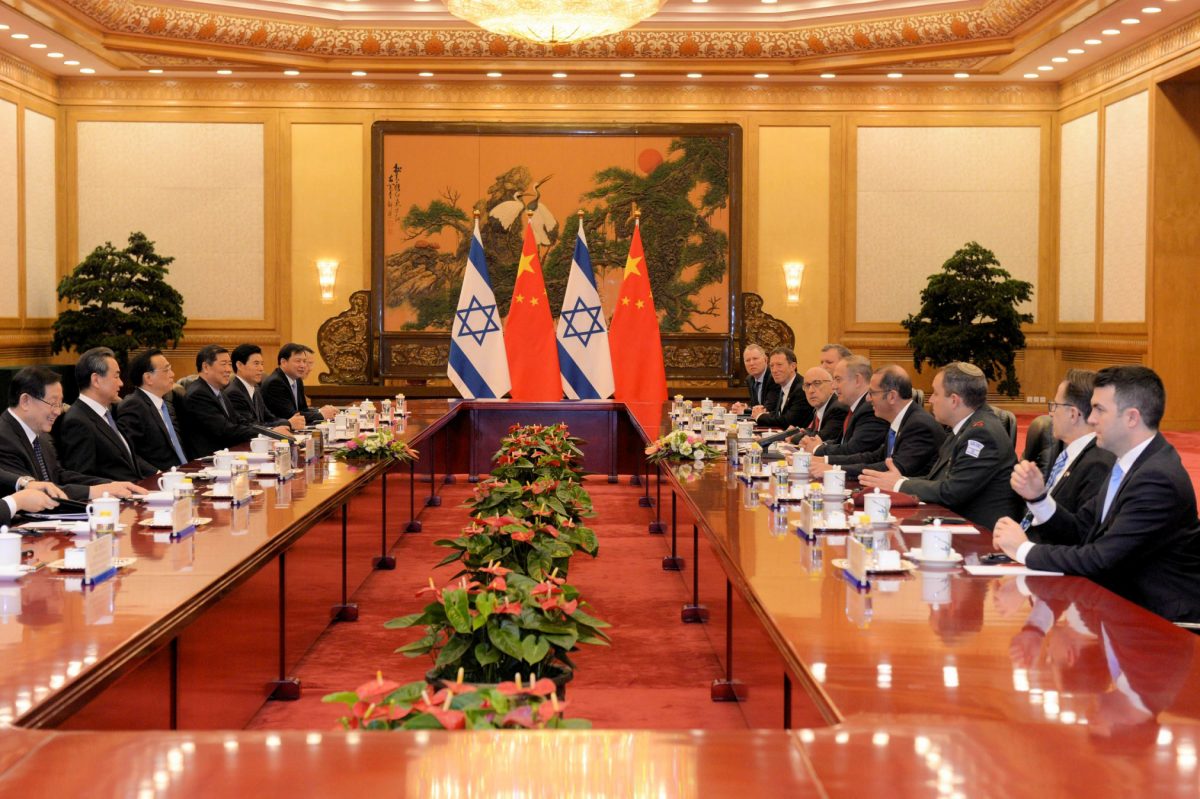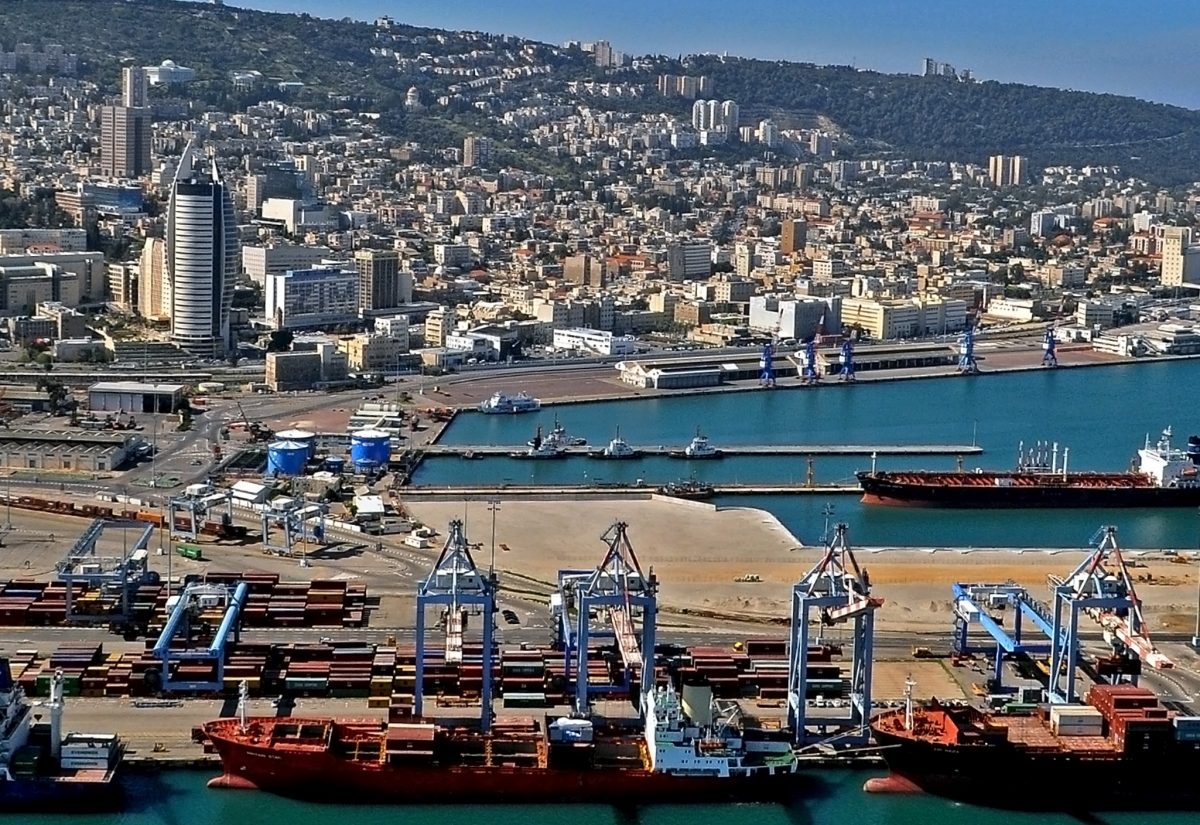Australia/Israel Review
Essay: Chinese Itzik comes to Haifa
Feb 3, 2022 | Matti Friedman

Beijing’s courtship of Israel has been canny and effective
Recently I drove up to Haifa to see with my own eyes a sight that, for most Israelis, has yet to sink in: the country’s brand new port, our third, which is beautiful, automated, efficient, and operated by the same Chinese company that runs the megaport at Shanghai. The first full container ship dropped anchor the day after my visit. Chinese characters adorn the soaring ship-to-shore cranes, freshly painted red and white; Israeli workers staff joysticks opposite computer arrays running Chinese software; and in the managerial offices sit Chinese executives. To get to the port, I paid a toll and drove through the Carmel Tunnels, which were dug a few years ago by the China Civil Engineering Construction Corporation. At a petrol station on the way I bought a pineapple yoghurt made by the iconic dairy-products giant Tnuva, founded as a cooperative by Labor Zionists and now controlled by Bright Food – 263 Huashan Road, Jing’an District, Shanghai. China was far, far away, until suddenly it was right here.
The most prominent face of China in Israel belongs to a guy named Itzik. His real name is Xi Xiaoqi, and he’s a 35-year-old resident of Beijing, but here he’s known as Itzik ha-Sini, or “Chinese Itzik”. He gets recognised on the street. He stars in hundreds of internet videos about life in Israel from a Chinese perspective, and about life in China made accessible for Israelis. Some of these appear on his own YouTube channel, but sometimes he appears on Israeli outlets like Channel 12 or KAN 11, the public broadcaster, where journalists are delighted to have a Chinese figure – the first – who speaks perfect, slangy Hebrew and has an acute grasp of the Israeli audience. He’s impossible not to like.
I caught Itzik on Zoom from Beijing. He was born in the city of Jiangyin, he said, son of a traffic cop and a real estate agent. He’d never met a Jew or heard a word of Hebrew before arriving at university at age 18. The school offered Japanese, Nepali, Dutch, and a few other languages, but his grandfather told him that Jews were smart – people of the book. Everyone thinks this in China, he said. If his years communicating with real Jews in Israel have disabused him of this notion, he was too polite to say so. During his Hebrew studies, first in Beijing with an Israeli teacher and then at Tel Aviv University, he adopted his Hebrew name, a diminutive of Yitzhak, or Isaac.
In 2009, with China taking a greater interest in Israel, he was selected to run the Hebrew desk at China Radio International (CRI), a state outfit that might uncharitably be called a propaganda arm or, more generously, a showcase for China’s best self. (The Hebrew desk doesn’t actually broadcast radio, only videos.) The CRI website has a lot of upbeat content about, for example, the many plusses of life in Xinjiang. In Itzik’s rise from an obscure city to an elite college, then to studies abroad, and then to an official media job, it’s possible to sense the hand of the state identifying and promoting a gifted young person.
In one video, he joins Golani Brigade soldiers in basic training, getting his shaggy hair buzzed by an army barber and struggling to clear a concrete wall in the obstacle course. He’s impressed! The tough guys from Golani play along, hands on their rifles. They look down on their funny guest from China and miss the real power dynamic – that the visitor represents a superpower that is rewiring the planet, while they represent a country whose entire population is the size of minor Chinese cities that even people in China probably haven’t heard of.
When I asked Itzik about human rights abuses in places like Xinjiang, which have been widely reported in the Western press, he replied, “I think the Israelis can understand China better than anyone else.” He meant that Israel is also the target of misleading coverage from the same outlets reporting on China, and that Jews are used to being lied about. “There’s the blood libel,” he said, “the idea that Israelis are drinking the blood of Palestinians. Speaking honestly, before I came to Israel, I heard things like that as well. But I wondered if it was true. And I came and checked and saw that it wasn’t.” He noted the abuse of the term “genocide”, which of course has been thrown around by Israel’s opponents as well as China’s, and has lost much of its meaning.
When one of Xi’s bosses, the vice president of CRI, was in Israel a few years ago, he was asked a similar question. “This is my first time in Israel,” he said, “and my impression is that the country is different from what I saw on CNN.” Leaving aside the question of what’s actually going on in places like Xinjiang, and disregarding the undoubted cynicism of the Chinese Government, these observations about the West’s addled media and Israel are true, and this messaging for an Israeli audience is smart.
Americans increasingly see China as an adversary, but Israelis don’t. When the Pew Research Centre carried out a survey on global attitudes in 2019, two-thirds of Israelis said their view of China was “favourable”, and just a quarter said the opposite. This was close to a mirror image of the American public, where it was 60% unfavourable and just 26% positive. Unlike Americans, Australians, and Canadians, Israelis haven’t yet seen China’s teeth. There hasn’t been a high-profile incident like the humiliating muzzling of NBA teams, for example. Stories like the disappearing tennis star Peng Shuai, or the erasure of freedoms in Hong Kong, haven’t made much of an impression. Israelis have many problems, and China has never been one of them.
Israel and China go way back; how far back depends on what you mean by “Israel” and “China”.
In the mid-1940s, before the Communist revolution and Israel’s War of Independence, the Zionist movement tried to mobilise Chinese support at the United Nations by calling in Morris “Two-Gun” Cohen, a onetime Saskatchewan hoodlum who’d become a bodyguard to Chinese leader Sun Yat-sen in the ’20s and remained close with the family. For a few months in 1948, Israel had relations with the Chiang Kai-shek Government, but then came Mao. Although the new state of Israel became the first Middle Eastern country to recognise the even newer People’s Republic in January 1950, those tentative feelers quickly fell victim to the Cold War and pan-Arab politics. It was 1992 before official relations resumed, complicated by American sensitivities.
In a great game between two powers there are always opportunities for agile little players who can work both sides, but getting that right isn’t easy. There have been a few defence deals signed and then dramatically junked because of pressure from Washington, like the US$1 billion Phalcon airplane snafu of 2000 and the Harpy drone debacle of 2004. The latter, according to Professor Aron Shai, the dean of Israel’s China scholars, “dragged US-Israel relations to a low point unknown since the imprisonment of Jonathan Pollard.” Defence deals have been off the table since then. And China continued to sell all kinds of things to our enemies in Iran: Four Israelis who died aboard a navy vessel in the 2006 war with the Iranian proxy Hezbollah, for example, were killed by a Chinese Silkworm missile.

China-Israel ties have been expanding rapidly, but many Israelis seem unaware of the potential risks (Image: IGPO/ Flickr)
And yet the relationship survived, and over time the flow of shekels and renminbi grew from a Jordan River trickle to a Yangtze torrent. For much of the last decade Chinese tech investments were the talk of the local venture capital scene. Barely a week went by without Chinese executives in Tel Aviv on the “startup nation” tour, and if in 2011 there were only five China-Israel tech deals, worth a total of US$31 million, by 2018 there were 72, worth US$4.8 billion. But about three years ago much of that unexpectedly petered out, and the capital hustlers who cluster in hot new markets moved on. Today, as financial analyst Sam Chester, a veteran Israel-China hand, told me, all the investment guys you used to see around the Chabad House in Shanghai or Chengdu are in Dubai. The end came, Chester said, partly because of a Chinese crackdown against citizens trying to move wealth out of the country. It was also because early Israeli sanguinity about breaking into the China market was dampened by too many failure stories, and because Israeli CEOs realised that state-linked Chinese stockholders affect potential American investors like citronella affects mosquitos.
But ties have only grown closer, cemented by – well, by cement. Last year I was driving up to Belvoir, a Crusader fortress above the fields of the Jordan Valley, when I came upon construction signs with lovely Chinese characters that looked as out of place as a pagoda in an Iowa cornfield. It turned out that Sinohydro, the state contractor raising dams and ports from Nigeria to Sri Lanka, was building Israel a hydroelectric plant. Israel’s second new port, at Ashdod, will be run by a Dutch operator, but it’s being built by China Harbour. There’s so much action that a group of big Israeli contractors just appealed to the Supreme Court to stop what they called a Chinese “takeover” of our infrastructure. (It didn’t work.) Trade between the two countries, worth barely US$1 billion in 2001, is now 10 times that, mostly in the form of Chinese exports to Israel.
Beyond the realms of concrete and steel, a notable feature of China’s presence in Israel can be found in the two Confucius Institutes that opened at Tel Aviv University and Hebrew University. The centres for China studies have brought Israeli scholars and students into greater contact with Chinese people – and with their government, which funds the institutes and shapes their content. Some scholars in Israel, like many colleagues abroad concerned by the approximately 500 Confucius Institutes that have opened worldwide, have warned that the centres compromise the academy. Once you’re in bed with “Confucius,” enjoying Chinese funding and scholarships, you’ll think twice before antagonising the people who write the cheque.
One critic is Noam Urbach, who fell in love with China after a post-army trip in the 1990s, followed by a few years of travel and study at Shandong University. He later spent more than a decade teaching Mandarin at Bar-Ilan University and the Interdisciplinary Centre in Herzliya. He found himself feeling increasingly unwelcome in the field as his criticism of Chinese government policies was frowned upon by colleagues and administrators eager to cooperate with Chinese institutions, less in the cash-strapped humanities than in science and tech, where real money is at stake. Israeli academics who study China, he said, have learned to speak very differently in public and in private. I asked if this meant that a department head, for example, might quietly suggest that a doctoral student change a research topic, or decide that a proposed academic conference might best be indefinitely postponed. “All the time,” he said.
“Let’s say an academic department in the sciences is studying a certain plant, and starts accepting funding from that plant to say good things about it,” he said. “Once that happens, those botanists aren’t botanists anymore.” Urbach isn’t describing an obscure academic spat: He’s saying that Israel’s China-watchers are being neutralised by the people they’re supposed to be watching. Urbach has let his doctoral studies lapse and currently runs an art gallery.
A moment of understanding came, he said, when he served as a translator at a meeting for executives from an Israeli company and the Chinese firm that had just bought a controlling share. (He wouldn’t name the companies.) The Chinese executives, he said, had studied every nook of the Israeli operation and knew every detail of every government regulation in the market. The investment, he understood, combined political and economic goals that were meant to serve each other.
Let’s take the dairy giant Tnuva. Any internal Israeli decision – about, say, fat content in processed cheese – now impacts a state-linked Chinese company. That decision is thus tied to our relationship with China, which includes tunnels and hydroelectric plants and ports, and might result in the phone ringing in the office of Israel’s foreign minister. Ni hao!
We have “entered the stage in which the Chinese have begun to create economic centres of power, which in time can be transformed into strategic and geopolitical centres of power,” Shai, the China scholar, who is a proponent of ties with the Chinese, wrote in his 2019 book China and Israel. “Realistically, we must anticipate that in Israel as well as in the region that it occupies, China will have influence at a level that currently seems the stuff of fantasy.”
Just two years after those lines were published, I was at the new port in Haifa and met Israeli guys named Dima, Yasser, and Chris, who were training on the mechanical claw that moves containers remotely from a control room overseen by a skilled operator from Shanghai. This is the first foreign venture for SIPG, the company that operates the Shanghai port, which moves about 43 million shipping containers a year. That’s nearly 15 times what comes in and out of the entire state of Israel.
The Americans expressed concern about this deal, in part because the old Haifa port, just across the bay, has long been used by the US Sixth Fleet. But no American company bid when the contract was up for grabs. The deal went ahead, and when I was there the new port crew was preparing to handle their first full ship, a Chinese Ocean Shipping Company vessel due the next day.

A Chinese firm now operates an entire port in Haifa, raising serious potential conflicts with the US Sixth Fleet, which also makes use of Haifa (Source: Wikimedia Commons)
As one of the Chinese managers, a man in glasses and a neon yellow vest, told me proudly, the port was actually operational last summer, half a year ahead of schedule. The Israeli government, on the other hand, was supposed to provide a rail link to the coastal train line about a mile from the pier – and is running three years late. China, the manager said, opens 30 miles of new track every single day.
Contracts with the Israeli government limit the autonomy of the Chinese company. Israeli security officers stationed at the port answer to the Israeli police. But the Chinese are in charge. The lease runs until 2045, but the Shanghai company is playing an even longer game than that. Part of the idea of the new port isn’t about Israel at all, but about consolidating containers from the smaller ships that come through the Suez Canal from China and the East, loading them onto larger vessels at Haifa’s deep-water port for transit west, thus streamlining global shipping and saving money.
Another part of the idea is to be here when trade expands between Israel and its neighbours, including current enemies. In such a scenario, Haifa goes back to being what it was before 1948: a portal to the region, not just to Israel. SIPG wants to be here when that happens.
I said I wasn’t sure about the chances, but the manager was unimpressed with my scepticism, and with our local problems. “We are here for business,” he said, “and the businessmen want peace.” The way he said it, “peace” didn’t sound like a fluffy Western dream. It sounded as blunt and necessary as an iron pipe.
I found myself wondering about this new world. The immediate threat to Haifa and its port facilities comes from Hezbollah, the Iranian proxy in Lebanon, which rocketed the city during the last war in 2006 and threatens to do so again if another war breaks out. China does billions of dollars of business with Iran. A major Chinese firm now has an entire port in Haifa. Imagine the port is disrupted or damaged, costing millions. A phone rings in Teheran. Ni hao!
What happens then? What does all this mean for the Middle East? And what happens if the US-China cold war becomes hot, with Israel in an increasingly convoluted minefield of interests – a Sixth Fleet port-of-call on one side of the bay, Shanghai on the other? It’s impossible to say. All we know is that a ship has sailed, and we’re on board.






